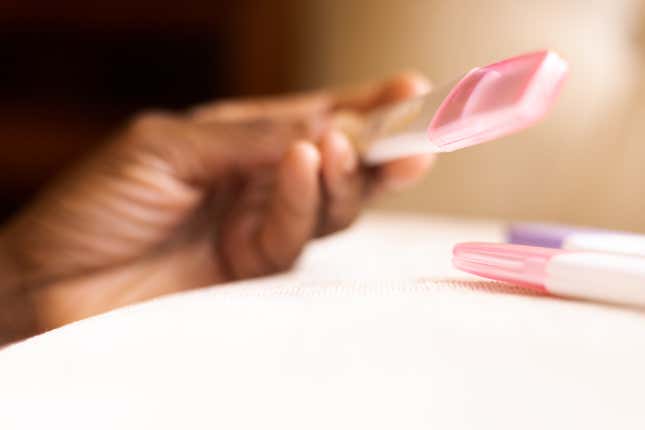
Whether you supported Roe v. Wade, or not, the Supreme Court’s decision to overturn Roe clearly has an impact on Black Americans.
The majority of Black Americans live in southern states, where most of the post-Roe abortion bans are being enacted. And Black Americans receive abortion care more than any other group in the United States, according to the Kaiser Family Foundation.
But, impact aside, what do Black people actually think about abortion and the end of Roe?
Well recent polling suggests that Black Americans broadly disagree with the Supreme Court’s decision to overturn Roe, the case establishing the constitutional right to an abortion.
In July, Pew Research found that 67 percent of Black Americans disapproved of the Supreme Court overturning Roe, compared to 55 percent of white Americans who disapproved of the decision.
In the same poll, 71 percent of Black respondents said that abortion should be legal in all or most cases. Roughly 40 percent of Black respondents said abortion should be legal in all cases. And only 9 percent of Black respondents said that abortion should be illegal in all cases.
When it comes to criminalizing women who have abortions, Black Americans are similarly in alignment, according to the GenForward Survey conducted in July by the University of Chicago. The survey found that only 9 percent of Black Americans believe that women in states where abortion is now illegal should go to jail.
Ashley Malone, a 24-year-old Black New Yorker, says the Supreme Court’s decision to overturn Roe was like “a punch in the stomach.”
“I feel like that’s kind of crazy, especially with people in jail for something that is pertaining to their own body,” says Malone. “I feel like that’s taking away every right to their own body and that’s ridiculous.”
Malone isn’t alone in feeling outraged over the Supreme Court’s decision.
“It freaking sucks for the government to tell people what they should and should not do with their bodies,” says Aaron Watford, 50, a Black man from Brooklyn, New York. “It should be legal for everybody, for every woman, for every man, that decides that they want to have the right to make their own decisions for their own bodies.”
However, as the polling suggests, Black Americans aren’t completely united on in what cases abortion should be illegal.
Alicia Broaddus, 52, a Black executive assistant who runs a youth basketball program in the Bronx, says she isn’t supportive of abortion being legal in all cases.
“There’s individuals who can possibly take advantage of the situation and wait too long to make a decision,” says Broaddus, “So I’m against that.”
However, Broaddus says she supports abortion in most cases, especially because she had one herself.
“I had precancerous cells on my cervix, and I found that I was pregnant at the same time,” says Broaddus. “So I had to abort for that reason otherwise… I probably would have had cancer.”
Ava Purkiss, an assistant professor of Black women’s history at the University of Michigan, says it’s not surprising that Black folks can be generally supportive of abortion rights while in some cases, holding conflicting feelings about abortion.
“Black people are capable of fostering complex and even ambivalent feelings about abortion,” says Purkiss. “But can still support political imperatives that help to secure bodily autonomy and racial justice and access to health care.”
Purkiss says that it’s a common misconception that just because most Black Americans identify as religious, they’d be less likely to support abortion rights.
In fact, the July Pew Research poll found that Black protestants are just as likely to say abortion should be legal in all or most cases as the general Black population.
“Abortion is about so much more than terminating a pregnancy. Abortion is about mobility, it’s about self-rule, and self-determination,” says Purkiss. “I suspect that Black people are supporting Roe even with having some of these religious commitments.”
Douglas Wilson, 43, a Black political consultant in Charlotte, North Carolina, says that his faith actually influences his belief that abortion should be legal.
“If you look at it from a religious standpoint, God gives us free will. Right,” says Wilson. “And so God gives you the ability to make a decision over your own body. So, that’s between you and God… it shouldn’t be a government telling you, you shouldn’t do this.”

